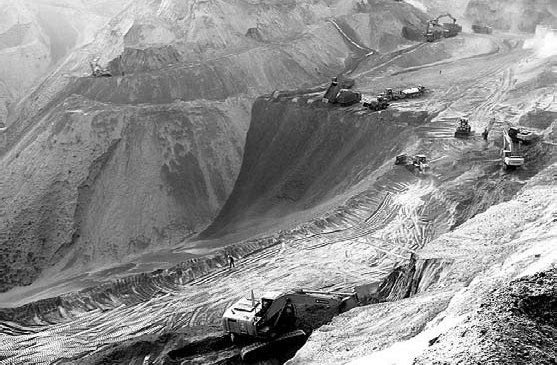Private capital cited as 'desirable' in urbanization
Updated: 2013-04-18 05:31
By Wei Tian (China Daily)
|
||||||||
|
A project currently carried out by China Pacific Construction Group in Lanzhou, which will create 25 square kilometers of urban area by removing more than 700 hills. Provided to China Daily |
Experts say alternative funding may help prevent the rapid expansion of local government debt
More local governments are turning to the private sector to help fund urbanization projects, as they face declining revenues amid slowing economic growth.
Experts said private investors could play a vital role in promoting China's urbanization, and could help prevent the rapid expansion of local government debt.
"Local government officials are approaching us on a daily basis seeking cooperation," said Yan Jiehe, chairman of China Pacific Construction Group, one of the largest private investors in domestic infrastructure construction.
"It is definitely a seller's market," he said.
China Pacific has been involved in more than 500 public projects nationwide via a "build-and-transfer" model, a form of project financing where a private entity receives a concession contract from the government to finance, design, construct and operate a public facility.
The private investor recovers their investment by payment in installments from the government from the operating income of the project.
China's new leadership has reiterated the role of urbanization in promoting growth, but it seems to be a tough assignment for cash-strapped local authorities due to limited financing channels.
Local fiscal revenue grew just 13.1 percent in the first quarter, down from 17.1 percent a year before.
In addition, the China Banking Regulatory Commission has called for the approval process for new local government loans to be made stricter.
"Loans are still a major source of funding for urbanization, but now banks won't neglect the potential risks simply because they are guaranteed by the government," said Wang Shuguang, a professor at Peking University's School of Esconomics.
In contrast, private investors are full of expectations and confidence about the opportunities posed by urbanization.
Around 200 companies under Yan's control reported combined revenue of 360 billion yuan ($58.3 billion) in 2012, and Yan is looking to expand that figure to more than 1 trillion yuan in 2016.
"It is only when private capital plays a leading role that urbanization can be successful," he said.
One of Yan's star projects under construction is in Lanzhou, Gansu province, which is also a "build-and-transfer" project.
The project involves creating 25 square kilometers of urban area by removing more than 700 hills. The entire project requires a total investment of 75 billion yuan.
"The government doesn't have to pay a cent for the project at the beginning. We could let it to the government at a proper price when the project is finished, otherwise we could rent it out on our own," Yan said.
The Ministry of Finance issued a policy late last year asking local authorities to avoid irregular financing behavior, including "build-and-transfer" models illegally guaranteed by governments.
Zhao Quanhou, head of financial research at the ministry's Fiscal Science Research Center, said whether "build-and-transfer" could prove to be a feasible model depends on the repayment cycle of the project.
"If their participation in these projects is voluntary, private investors can serve as a filter of irregular financing of local governments," Zhao said,
But if the cycle is too short, it will only add more pressure to already heavily indebted local governments, he said.
According to Yan, "we're wiser enough not to invest in unprofitable projects. We will not deal with authorities who rely on blind borrowing and without the ability to repay debts".
In addition, Yan said, "build-and-transfer" could be a more transparent and reasonable model than project bidding.
"Many of the projects won by bidding won't even last for more than a year before they need maintenance, but ours come with a five-year guarantee," he said.
weitian@chinadaily.com.cn
(China Daily 04/18/2013 page14)

 In Photos: 7.0-magnitude quake hits Sichuan
In Photos: 7.0-magnitude quake hits Sichuan
 Li Na on Time cover, makes influential 100 list
Li Na on Time cover, makes influential 100 list
 FBI releases photos of 2 Boston bombings suspects
FBI releases photos of 2 Boston bombings suspects
 World's wackiest hairstyles
World's wackiest hairstyles
 Sandstorms strike Northwest China
Sandstorms strike Northwest China
 Never-seen photos of Madonna on display
Never-seen photos of Madonna on display
 H7N9 outbreak linked to waterfowl migration
H7N9 outbreak linked to waterfowl migration
 Dozens feared dead in Texas plant blast
Dozens feared dead in Texas plant blast
Most Viewed
Editor's Picks

|

|

|

|

|

|
Today's Top News
Live report: 7.0-magnitude quake hits Sichuan, heavy casualties feared
Boston suspect cornered on boat
Cross-talk artist helps to spread the word
'Green' awareness levels drop in Beijing
Palace Museum spruces up
First couple on Time's list of most influential
H7N9 flu transmission studied
Trading channels 'need to broaden'
US Weekly

|

|








